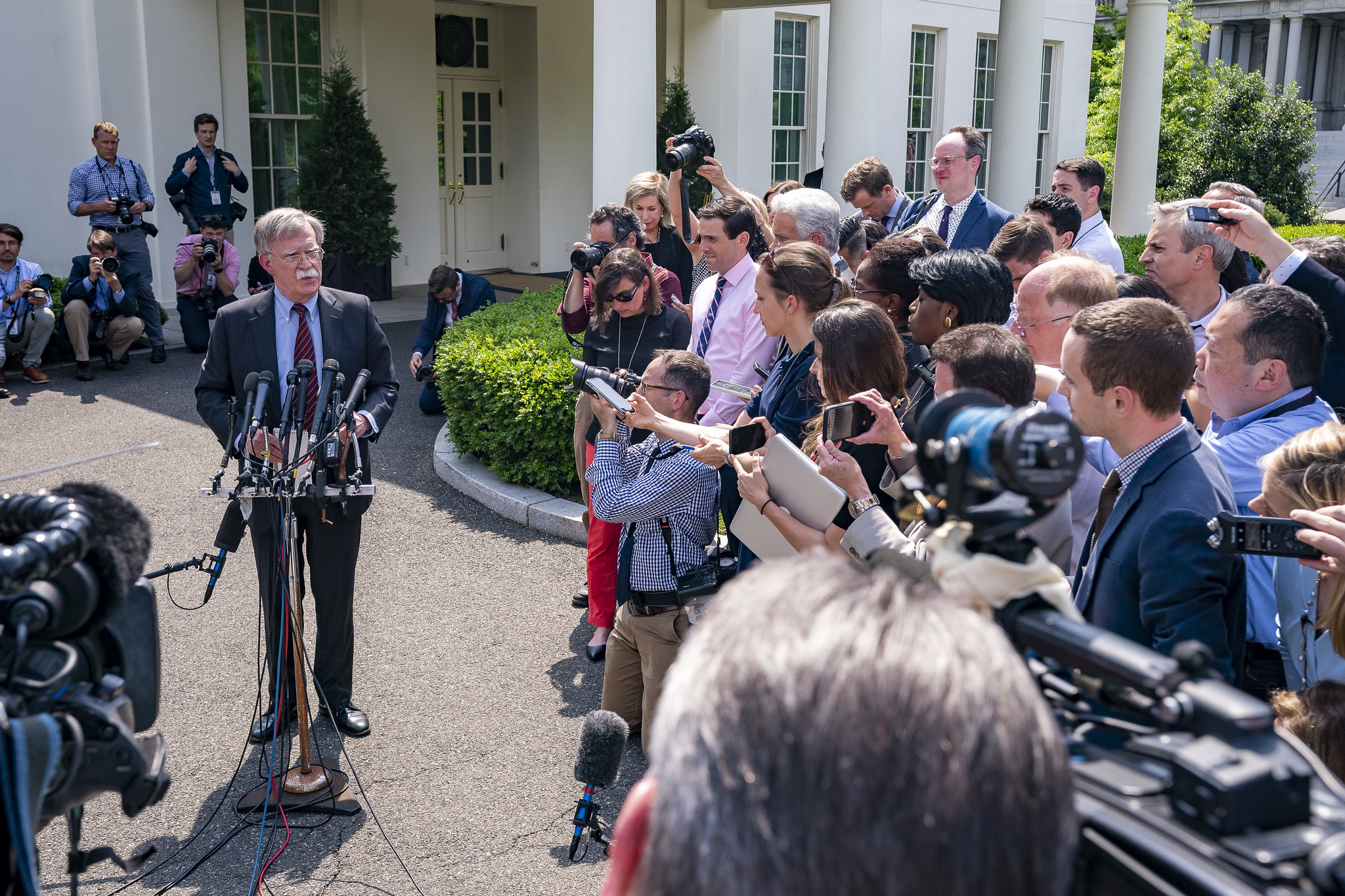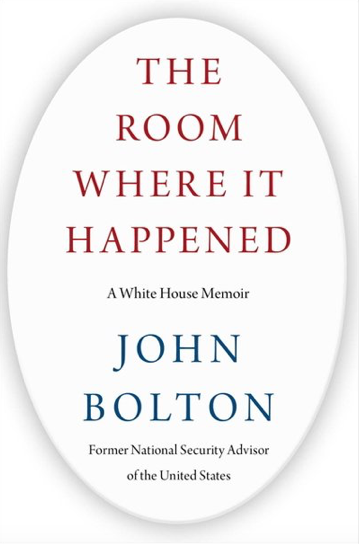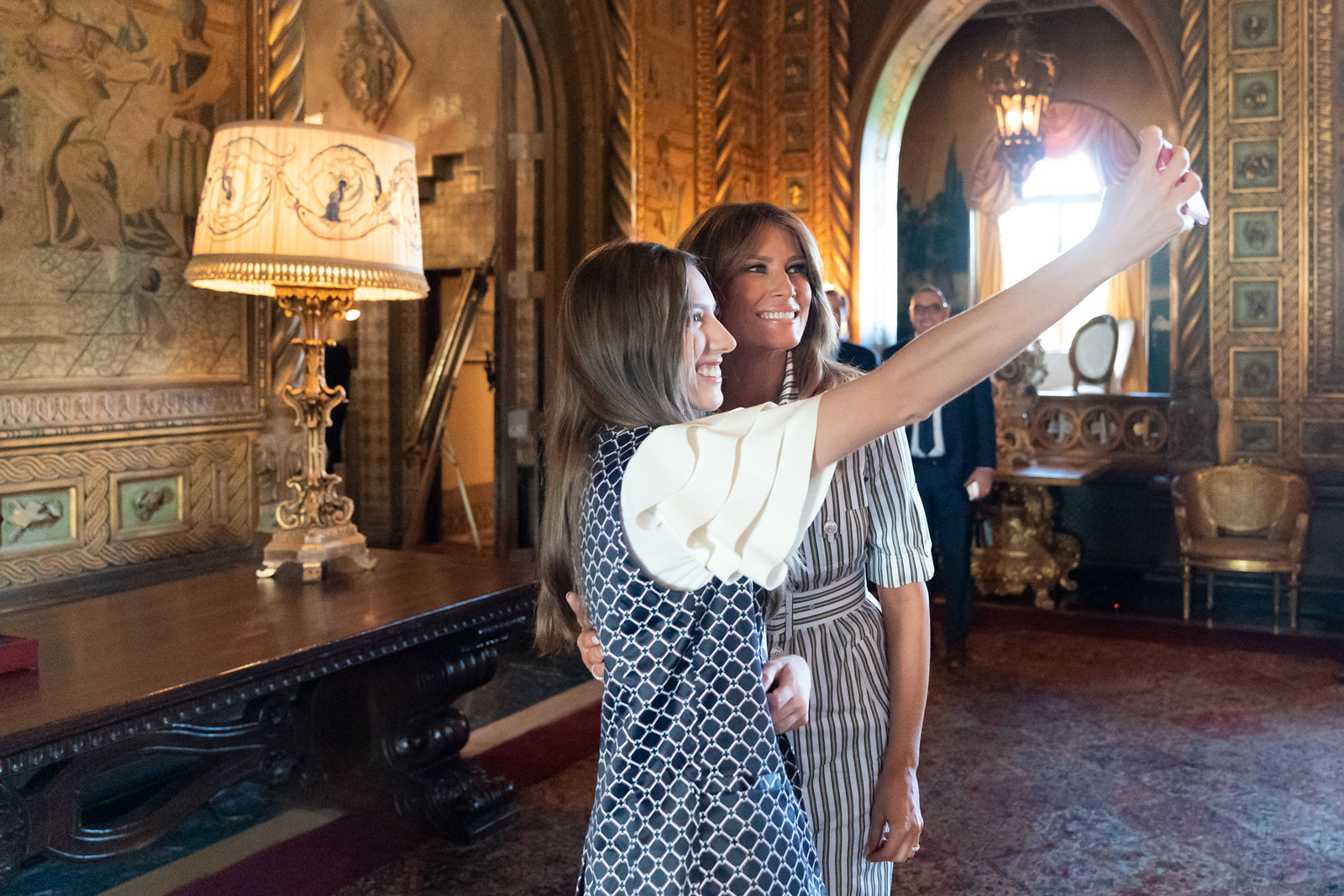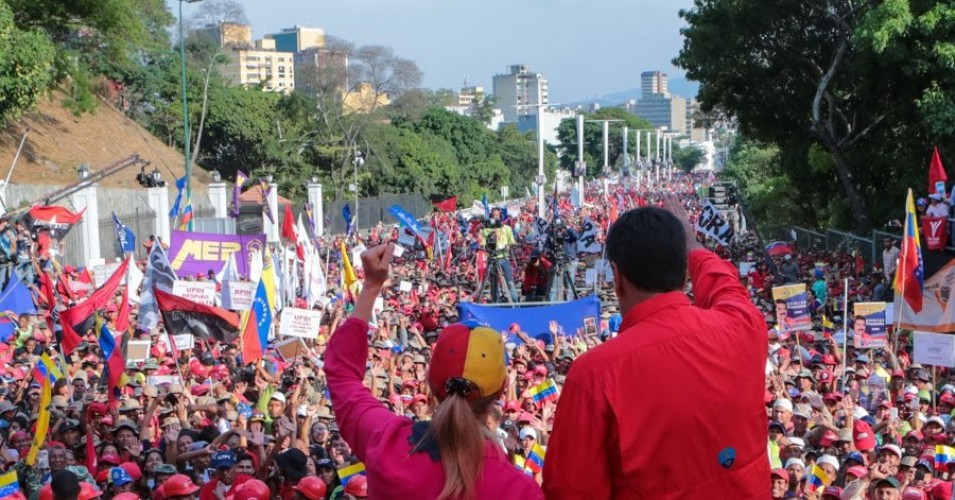Four major sanctions over 10 months that crippled the Venezuelan economy are hardly indicative of an administration that, in Bolton’s words “vacillated and wobbled,” writes Leonardo Flores.

White House National Security Advisor John Bolton speaks to reporters on events occurring in Venezuela, April 30, 2019, outside the West Wing. (White House, Tia Dufour)
By Leonardo Flores
Common Dreams
 From the first paragraph of “Venezuela Libre,” the ninth chapter of John Bolton’s book, “The Room Where It Happened,” it is obvious that the tale Bolton spins is full of fabrications, half-truths, propaganda and the occasional kernel of truth.
From the first paragraph of “Venezuela Libre,” the ninth chapter of John Bolton’s book, “The Room Where It Happened,” it is obvious that the tale Bolton spins is full of fabrications, half-truths, propaganda and the occasional kernel of truth.
The chapter is a 35-page screed in which the infamous warmonger places blame for the Trump administration’s disastrous Venezuela policy on everyone from Treasury Secretary Steve Mnuchin, to State Department bureaucrats and Secretary of State Mike Pompeo, and, of course, President Donald Trump.
The criticism also extends to opposition figure Juan Guaidó and Colombian President Ivan Duque. Exempt from criticism are the policy’s two architects: Mauricio Claver-Carone (handpicked by Bolton as the National Security Council’s senior director for the western hemisphere) and Bolton himself.
Per Bolton, Venezuelan President Nicolás Maduro remains in power only because the Trump administration lacked the determination to keep the pressure on. He argues that sanctions were neither strict nor swiftly applied.
Yet during Bolton’s tenure, the Trump administration blocked Venezuela’s ability to trade gold, froze the assets of state oil company PDVSA (including U.S. based subsidiary Citgo Petroleum), sanctioned Venezuela’s Central Bank, and imposed an economic embargo. All of this occurred between November 2018 and August 2019, during Bolton’s tenure as Trump’s national security adviser.
Four major sanctions over 10 months that crippled the Venezuelan economy are hardly indicative of an administration that “vacillated and wobbled”, in Bolton’s words.
There was nothing slow about the implementation of these sanctions; they were applied in reaction to events on the ground and designed to cause as much economic damage as possible.
The gold industry sanction came as Venezuela was exporting it to Turkey. The PDVSA sanctions were intended as a death knell for Venezuela’s oil industry, preventing Citgo from refining its oil and sending diluents to process Venezuela’s heavy crude (it was also meant to hand over Citgo and its assets to Juan Guaidó). The Central Bank sanction froze Venezuelan assets abroad, essentially freezing it out of the international financial system and impeding the country’s ability to import goods, including food and medicine.
The August 2019 economic embargo that prevented any U.S. business from working in Venezuela was compared to sanctions “faced by North Korea, Iran, Syria and Cuba” and was announced just as the Venezuelan government and opposition were to engage in talks in Bermuda.
 The most useful piece of information to come out of “Venezuela Libre” is Bolton’s assertion that in January 2019, then-UK Foreign Secretary Jeremy Hunt was “delighted to cooperate on steps [the UK] could take, for example freezing Venezuelan gold deposits in the Bank of England.”
The most useful piece of information to come out of “Venezuela Libre” is Bolton’s assertion that in January 2019, then-UK Foreign Secretary Jeremy Hunt was “delighted to cooperate on steps [the UK] could take, for example freezing Venezuelan gold deposits in the Bank of England.”
Days later, the Bank of England (BoE) froze over $1.2 billion in gold belonging to Venezuela, despite the fact that it is supposed to be an independent institution “free from day-to-day political influence.”
This revelation by Bolton will likely be used in the Venezuelan government’s lawsuit against the BoE. The lawsuit seeks to free Venezuela’s gold in order to transfer it to the United Nations Development Programme, which will purchase food and medical supplies for the country to counter the Covid-19 pandemic.
Bolton even lays out an added benefit of his grim pursuit of sanctions: “central banks and private bankers weren’t looking for reasons to be on the Fed’s bad side,” meaning that they would cease to do business with Venezuela or freeze its assets. Known among sanctions experts as “overcompliance,” Bolton exposes this as a feature, not a bug, of his sanctions regime.
The State Department even boasted of how tough these sanctions were in a since deleted fact sheet, yet if they had been applied all at once — as Bolton presumably wanted, there is no reason to believe regime change would have followed. The Maduro government demonstrated its capacity to adapt to the sanctions, staving off the worst of Covid-19 and, despite the economic devastation, showing economic growth in the fourth quarter of 2019.
Sanctions Cruel & Counterproductive
In addition to being cruel, the sanctions were counterproductive in terms of their desired goal to have the population rise up against the government. One survey found that 82 percent of Venezuela reject the sanctions, and even the country’s most prominent opposition pollster admitted that the majority of Venezuelans “strongly reject the general, economic, oil and financial sanctions that affect the population.”
At the risk of praising Bolton, he at least remains honest about the sanctions. While the State and Treasury Departments routinely insist the sanctions only affect Venezuelan government insiders, Bolton admits “the harm [they] would cause the Venezuelan people.”

First Lady Melania Trump poses for a photo with Fabiana Rosales de Guaido, March 28, 2019, at Mar-a-Lago in Palm Beach, Florida. (White House, Andrea Hanks)
It wasn’t just the sanctions that were counterproductive from the perspective of the White House. The military threats, attempted coups and provocations also helped unite Maduro’s base. While Bolton laments Trump’s fixation on military threats and his calls for the Pentagon to draw up plans for an invasion, it wasn’t because the notorious hawk suddenly developed dovish sensibilities, rather it was because of the “inevitable congressional opposition” and his belief that regime change would not require U.S. troops.
Got Played
Bolton dedicates a substantial portion of the chapter to detailing the events of Guaidó’s April 30 coup attempt, still believing that they were so very close to achieving their goals that day.
Bolton and the White House thought they had convinced Defense Minister Vladimir Padrino López to defect, along with other key figures, including the head of Venezuela’s Supreme Court. They did not defect. Instead, the coup fizzled within hours and all Guaidó managed to do was look foolish as he and around a dozen soldiers briefly took over a highway overpass.
In the media, Bolton insisted that Padrino López betrayed the coup plotters at the last minute, but everything indicates that Bolton “got played,” as Trump put it in June 2019, when he was reported – not for the first time – to have lost interest in Venezuela.
He certainly got played by Fabiana Rosales, Guaidó’s spouse, who appealed to Bolton’s vanity by claiming that the Venezuelan government is “most afraid when John Bolton starts tweeting.” Bolton brags about his tweets and stunts (like when he flashed a notepad with “5,000 troops to Colombia” scribbled on it during a press conference), but these were used as propaganda to solidify the Maduro government’s base.
To wit, in January 2019, Venezuela’s civilian militia had under 2 million members; today, that same militia has over 4 million enlisted. Bolton, with his constant tweeting about Venezuela and to Venezuelan officials, as well as his history of warmongering, did much more to make Venezuelans believe the U.S. might invade than Trump’s own threats.
Bad Analysis & Ignorance
Bolton’s hubris has long been known, but what’s rather stunning about the Venezuela chapter is his poor analysis of the situation and (willful?) ignorance of facts. Delving into all of Bolton’s lies and misstatements would take another thousand words, but here are three of the many examples.

President Nicolás Maduro addressed hundreds of thousands of supporters on May 1, 2019, a day after Guaidó’s attempted coup.
He writes that President Maduro was “held under the tightest security for several days… [and] remained invisible, not coming out in public” after the April 30 coup. Yet the photo above shows Maduro addressing tens, if not hundreds, of thousands of supporters on May 1.
Bolton claims that government supporters burned humanitarian aid trucks on Feb. 23, despite the many reports that came out proving the opposition itself had burned the aid. He cites The Daily Mail in claiming that National Constituent Assembly President Diosdado Cabello sent his children to China on Feb. 23, yet they appeared live in Caracas on Venezuelan television four days later.
The White House is caught in an echo chamber, believing the very propaganda it seeds in the mainstream media. Ironically, propagandist-in-chief Trump, as quoted by Bolton, appears to be closest to breaking out of the information bubble. Here are a few of Trump’s quotes in Bolton’s chapter “Venezuela Libre”:
- Maduro is “too smart and too tough” to fall.
- “I don’t like where we are… The entire army is behind him… I’ve always said Maduro was tough. This kid [Guaidó] – nobody’s ever heard of him.”
- On Guaidó: “He doesn’t have what it takes… Stay away from it a little; don’t get too much involved.”
Of course, Trump isn’t immune to propaganda, claiming that Venezuela “is really part of the United States” – a damning statement of Bolton’s beloved Monroe Doctrine.
In another turn of irony, the best analysis of the situation in Venezuela in “The Room Where It Happened” comes from Russian President Vladimir Putin, which Bolton dismisses as a “brilliant display of Soviet-style propaganda.” Putin concludes that the White House’s policy has strengthened Maduro, offering the massive May Day rallies in support of the Maduro government as evidence. Apparently, the Russian president was the only person offering Trump an alternative perspective on Venezuela.
Perhaps the biggest takeaway from Bolton’s “Venezuela Libre” chapter is that he and others in the administration dissuaded Trump from engaging in dialogue with the Venezuelan government. Unfortunately, even with Bolton gone from the White House, other actors continue to influence Trump in the same way.
On June 19, in an Axios interview, Trump expressed a willingness to meet with Maduro and once again expressed skepticism of Guaidó. He retracted his remarks the day after they were published, following pressure from the media, Florida politicians and presidential candidate Joe Biden, who predictably tried to outflank Trump from the right.
As Bolton put it, “support on both sides of the aisle for [the] hard line in Venezuela was almost uniform.” Regardless of who wins in November, there appears to be little hope for lifting the cruel sanctions, if even suggesting dialogue is akin to a third rail in American politics.
Yet in Venezuela there is a sense of hope that cooler heads will prevail, as moderates are breaking off from the hardline opposition, negotiating with the government and preparing for upcoming legislative elections.
Bolton’s book, and his time in office, proves that the United States – try as it might – is no longer capable of imposing its will. Hopefully, both that chapter of history and Bolton’s career have finally come to an end.
Leonardo Flores is a Latin American policy expert and campaigner with CodePink.
This article is fromCommon Dreams.
The views expressed are solely those of the author and may or may not reflect those of Consortium News.
Please Contribute to Consortium
News on its 25th Anniversary
Donate securely with  PayPal here.
PayPal here.
Or securely by credit card or check by clicking the red button:

To Mr. Flores (and CN):
Thank you for this excellent, realistic, hard-hitting article showing how ‘clever’ the insufferably arrogant Washington Establishment is at misleading itself – though sadly too many U.S. citizens continue to believe the D.C. drivel …
I wish to commend Consortium News for your continued superb reporting, and will be sending you a donation shortly.
Peace to all good people out there, and thanks for all you do. (As for the POS in the Beltway, Tel Aviv, and elsewhere who are instigating wars… Karma’s a b**ch, don’t forget …)
Today, June 28th, John Bolton’s “The Room Where it Happenned” is still ranked #2 on Amazon’s best seller list. I reported the same rating on the 26th. Now there are 207 reviews, and I challenged my cowardism and scanned a few–not all are positive–that’s relieving, so at least I didn’t vomit up my breakfast. Still, he has a following, which is alarming. There are almost as many “1” ratings as “5” ratings.
Black & White. One way or another, the psycopath is getting wealthy from this level of sales. Its true that with Amazon Prime subscribers, readers pay nothing for a kindle read, and so us authors are cheated out of some percentage of the royalties (it’s really hard to figure). In conclusion: Please don’t buy it–your just supporting the maniac.
Anyone who buys this guy’s book (or anything else he has to sell) is a complete and utter imbecile!
Great article illustrating how Washington “thinks”. Amazing that Bolton is considered one of the “adults in the room” in DC.
Since Obama declared a National Emergency with sanctions on Venezuela on March 8th, 2015, the country has been teed up to be another one of Obama’s forever wars like Ukraine and Libya and Yemen. A brief respite under Trump, despite horrible sanctions; as The Grayzone notes, Biden knows how to set up death squads and turn Latin America into narco states (most recently Honduras, possibly Bolivia is headed that way as well?)
From his record, I can’t imagine that Joe Biden will treat the Venezuelan people any better than Trump or his predecessors. Even Bernie Sanders called Maduro a dictator. Trump, in some of what he says and does regarding foreign policy, is a little to the left of Sanders, Biden, Warren et al, if for all the wrong reasons of ignorance, racism and sheer laziness. But for the poor, better a lazy US President than an interventionist one like the Clintons or the Bushes.
Or Obama… And no Biden won’t be any better on any overthrow of govts “we” don’t like, don’t do as we say; nor any better on visiting war, invasion, drone murdering than any previous president, Blue or Red, over the past 60-70 years.
As for Sanders I seem to recall that he not only called Maduro a dictator (and Sanders is *supposed* to be leftish!! a socialist-lite!!! Codswallop) but that he was (like just about every other Red and Blue Face in Congress) gung-ho for Maduro being overthrown, for our(!!) “right” to determine who should/shouldn’t be the president/leader of government in Venezuela (or anywhere else).
Thank you for your reply below to the protect and serve fellow. NO ONE in the U.S. military is serving me or this actual country, they are serving the oligarchs who rule it. One good thing about all the protests is that I am no longer having to hear about what fucking heroes cops are, what has been the constant refrain on television for years. I just wish more people saw the link between the police and our foreign interventionism; our militarism knows no bounds.
Bravo!
Excellent review of a portion of the book.
Keep writing.
Something that I find appalling is that most of the most rabid warhawks that are obsessed with illegally interfering in other sovereign states’ affairs, are proven draft dodgers. For example, Bolton was a zealous supporter of the Vietnam War, something that should have discredited any future politicians because of it’s stupid and corrupt rationale, but when it came for his time to go over there and serve and risk his own ass, he evaded the draft by joining the National Guard and has admitted that he did it and didn’t want to fight. One could say his patriotism and sense of duty wobbled and vacillated. It’s the worst kind of person to be in charge of foreign affairs, just like Bush was, and Trump with the bone spurs didn’t fight over there, and Biden supposedly had asthma so he couldn’t go make his patriotic sacrifice either. And yet guys like these are gung ho to send our sons and daughters to other far-flung places to risk horrible injury, physical and mental, and death, but when their generation was asked to do the same, they were the first to run and hide. It’s strange that when they get older, they can just slap on an American flag lapel pin and instantly become respected patriots and tough guys. One would think that candidates like Tulsi Gabbard who at least have a modicum of what it means to sacrifice and serve would be the first candidates that are most respected on matters of war and peace.
Yup! You are right and the quote that makes many see red:
“I had no desire to die in Southeast Asian rice paddy. . . . I considered the war in Vietnam already lost.” I’m all for having his own words on his tombstone.
He considers himself above the fray and above criticism because he is special, we need him we just don’t understand. He is also surrounded by legions just like him. Past , present and future to be assured.
They go to elite schools, take blood oaths, become Ultra Super Wealthy Elitist (the USWETS) through privilege, wealth, networking and constant business law manipulation – that is, behaving apparently the way now accepted as not being corrupt ???? – by DOJ.
I think the case can be made in court that some are afflicted, touched in head some. Finding a judge not suffering from a similar affliction might be the most difficult thing .
I swore off vitriolic rants for Fathers Day, now I’m getting ready for the 4rth of July!
Thanks CN
“who at least have a modicum of what it means to sacrifice and serve” – whom, exactly? There’s little worthy of respect to be an active member of the US military machine which exists only to promote and protect the interests of US oligarchs and corporations.
Clinton (Slick Willy) didn’t “serve” either. Not exactly behind the door at exacting unwarranted, hypocritical, terroristic punishment on another nation, either. Serbia.
Frankly, all such as Obama, Bolton, Bush, Cheney, the Strumpet and on and on are bloodthirsty psychos, underneath the pleasant patina (well the Strumpet doesn’t have that! He seems to run the WH also known as the USA like it was “The Apprentice….”
I read that Bolton joined the National Guard so,” he didn’t have to die in a rice paddy. ” Maybe his book can die there for him.
They’re not really “conservatives”. They’re radical statist reactionaries.
American politics is so monolithic, for example in it’s approach to Venezuela, almost 100% agreement on the current policy, no questions asked, that they’re actually blind to the fact that they’re strengthening Maduro.
I found it quite telling that Trump was willing to engage with Maduro (an actual acknowledgement of reality), but nobody seems to back him up on this reasonable step.
I’m glad people are poking holes in the official narrative though, at some point the whole artifice will come crashing down.